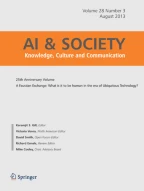Abstract
Two models are developed for updating opinions in social networks under situations where certain beliefs might be considered to be competing. These two models represent different attitudes of people towards the perceived conflict between beliefs. In both models agents have a degree of tolerance, which represents the extent to which the agent takes into account the differing beliefs of other agents, and a degree of conflict, which represents the extent to which two beliefs are considered to be competing. Computer simulations are used to determine how the opinion dynamics are affected by the inclusion of conflict. Results show that conflict can enhance the formation of consensus within the network in certain circumstances according to one of the models.
Similar content being viewed by others
Explore related subjects
Discover the latest articles, news and stories from top researchers in related subjects.References
Acemoglu D, Ozdaglar A (2011) Opinion dynamics and learning in social networks. Dyn Games Appl 1:3–49
Chen S, Glass DH, McCartney M (2015) Dynamics of conflicting beliefs in social networks. In: Proceedings of the 6th workshop on complex networks (CompleNet 2015), Studies in computational intelligence, vol. 597, Springer, New York, 25–27 March 27, 2015, pp. 171–178
Deffuant G, Neau D, Amblard F, Weisbuch G (2000) Mixing beliefs among interacting agents. Adv Complex Syst 3:87–98
Douven I, Riegler A (2010) Extending the Hegselmann–Krause model I. Logic J IGPL 18:323–335
Fortunato S, Latora V, Pluchino A, Rapisarda A (2005) Vector opinion dynamics in a bounded confidence consensus model. Int J Mod Phys C 16(10):1535–1551
French JRP (1956) A formal theory of social power. Psychol Rev 63:181–194
Fu G, Zhang W, Li Z (2015) Opinion dynamics of modified Hegselmann–Krause model in a group-based population with heterogeneous bounded confidence. Phys A 419:558–565
Harary F (1959) A criterion for unanimity in French’s theory of social power. In: Cartwright D (ed) Studies in social power. Oxford, England, pp 168–182
Hegselmann R, Krause U (2002) Opinion dynamics and bounded confidence: models, analysis, and simulations. J Artif Soc Soc Simul 5(3):1–33
Jacobmeier D (2005) Multidimensional consensus model on a Barabasi–Albert network. Int J Mod Phys C 16:633–646
Krause U (2000) A discrete nonlinear and non-autonomous model of consensus formation. In: Elaydi S, Ladas G, Popenda J, Rakowski J (eds) Communications in difference equations. Gordon and Breach Publishers, Amsterdam, pp 227–236
Liu Q, Wang X (2013) Opinion dynamics with similarity-based random neighbours. Sci Rep 3:2968
Lorenz J (2007) Continuous opinion dynamics under bounded confidence: a survey. Int J Mod Phys C 18(12):1819–1838
Lorenz J (2008) Fostering consensus in multidimensional continuous opinion dynamics under bounded confidence. In: Helbing D (ed) Managing complexity. Springer, Berlin, pp 321–334
Pineda M, Buendía GM (2015) Mass media and heterogeneous bounds of confidence in continuous opinion dynamics. Phys A 420:73–84
Pluchino A, Latora V, Rapisarda A (2006) Compromise and synchronization in opinion dynamics. Eur Phys J B 50:169–176
Quattrociocchi W, Caldarelli G, Scala A (2014) Opinion dynamics on interacting networks: media competition and social influence. Sci Rep 4:4938
Riegler A, Douven I (2009) Extending the Hegselmann–Krause model III: from single beliefs to complex belief states. Episteme 6:145–163
Wang H, Shang L (2015) Opinion dynamics in networks with common-neighbours-based connections. Phys A 421:180–186
Weisbuch G, Deffuant G, Amblard F, Nadal JP (2002) Meet discuss and segregate! Complexity 7:55–63
Zollman KJ (2012) Social network structure and the achievement of consensus. Polit Philos Econ 11(1):26–44
Acknowledgements
This publication was made possible by a grant from the John Templeton Foundation (Grant No. 40676). The opinions expressed in this publication are those of the authors and do not necessarily reflect the views of the John Templeton Foundation. The first author has been partially supported by the National Natural Science Foundation of China (Grant Nos. 61175055, 61305074 and 61673320).
Author information
Authors and Affiliations
Corresponding author
Additional information
This paper is an extended version of the paper that has been included in CEUR Proceedings of the European Conference on Social Intelligence (ECSI 2014), Barcelona, Spain, 3–5 November 2014.
Rights and permissions
About this article
Cite this article
Chen, S., Glass, D.H. & McCartney, M. Two-dimensional opinion dynamics in social networks with conflicting beliefs. AI & Soc 34, 695–704 (2019). https://doi.org/10.1007/s00146-017-0784-6
Received:
Accepted:
Published:
Issue Date:
DOI: https://doi.org/10.1007/s00146-017-0784-6
